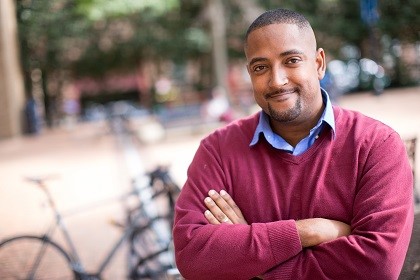Steven Leyva | Guest Writer for MFA Program

Hood’s creative writing MFA program welcomes Steven Leyva as guest writer for June 2024 residency.
Q&A
Program
- Creative Writing (MFA)
Department
- English & Communication Arts
Steven Leyva is a Baltimore-based poet and professor. He is the author of Low Parish and The Understudy’s Handbook, which won the Jean Feldman Poetry Prize. His latest collection, The Opposite of Cruelty, is forthcoming from Blair Publishing in spring 2025. Leyva earned his MFA from the University of Baltimore, where he is currently an associate professor in the Klein Family School of Communications Design.
Leyva will serve as a guest writer for the inaugural summer residency of the creative writing MFA program at Hood College. In the conversation below, Leyva discusses his new collection, the relationship between anime and poetry, and how MFA programs build transferable skills for students.
When did you first become interested in writing and what sparked your passion for poetry?
During my junior year in undergrad, my closest friend switched majors from theater to English/creative writing. He asked me if I’d consider writing some poems, so he would have at least one person to talk with about poetry. I gave it a shot and never looked back. Which is to say, I was relatively late to the party. So, for me, poetry and my passion for it have always been connected to friendship and community.
What inspired your forthcoming collection, The Opposite of Cruelty?
I wrote some of the foundational poems in The Opposite of Cruelty during the early months of COVID quarantine—a Crown of Sonnets called “Halo,” an invocation made of false starts, a few self-portraits. In those poems, there seemed to be a question arising, “What is the opposite of cruelty?” The book and the other poems try to answer that question in small and larger ways.
How does your love of anime and comic books influence your writing and scholarship?
Well, for one, it means I don’t really compartmentalize my life. I write scholarship about my hobbies. I let comic book characters populate my poems, and I let comic theory shape my poetics and aesthetics about how poems are shaped on the page. The stanza and the comic book panel aren’t that different.
What are your plans and hopes for your time as a guest writer at the low-res MFA program at Hood College?
I hope that I can make it an inch easier for the poets and writers there to remain curious about their creative process and the artifacts they are writing.
What do you see as the benefits of the low-residency model?
This is a difficult question to answer, but I think the benefits of the low-res model are permutations of the more general benefits of an MFA. This model provides a way to organize a person’s time around some intensive learning and writing experiences—it sort of squeezes the accordion of apprenticeship to fit a certain sensibility and to sound a certain useful “note.” Low-res does allow for a community from across many different regions, which does an interesting thing to a group’s sense of place and placemaking.
How do you think students can leverage their creative talents into professional careers?
Creative writers are often skilled problem solvers, and because the art of writing involves how you engage an audience, they are often decent at communicating creative solutions to old problems. That’s a transferable skill and one that can apply to many different professions. There are others as well. Revising, giving feedback, receiving feedback, developing a sustainable process of making—all those skills are invaluable in various professions. So, I’d say that students should be just as creative in thinking about what and how an MFA builds transferable skills as they are about how to invent new poetic forms, or how to resolve a conflict with the protagonist, or which voice works best for which genre.
Learn more about Hood’s new low-residency MFA in creative writing here.
Are you ready to say Hello?
Choose a Pathway
Information will vary based on program level. Select a path to find the information you're looking for!
